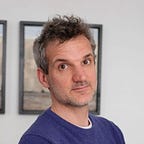Nietzsche and Redemption
How a thought experiment about time unburdens us of shame
In the film Arrival, based on a short story by Ted Chiang, Dr Louise Banks, an academic linguist, is recruited by the US Army to investigate an extraterrestrial landing site. During a number of contacts she is confronted with the knowledge that everything in her life is determined, that “free will” is a fiction.
While the story explores the complexities of contacting extraterrestrial life, language, philosophy and even international relations, it is ultimately about suffering. The discovery enables Banks to a look at all the suffering in her life in a new way, empowering her to face the most tragic aspects of her life in a calm light.
Friedrich Nietzsche, as I have outlined in a previous article, suffered immensely throughout his life. His father died when he was just five years old. He had problems with his sight that left him almost blind, and had been sickly almost all his life having been afflicted with injuries and disease as a soldier in the 1860s and later as a medical orderly in the Franco-Prussian War of 1871, a conflict which also left psychological scars.
Nietzsche had also suffered deep emotional upsets in his adult life. Lou Andreas-Salomé, the woman he loved and proposed to a number of times had spurned him and…
